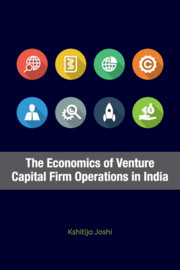Book contents
- Frontmatter
- Contents
- List of Tables
- List of Figures
- Acknowledgements
- 1 Introduction
- 2 Ecosystem and Strategic Decision Making
- 3 Context and Methods
- 4 Fund Raising: Systematic and Non-systematic Influences
- 5 High-Tech Clusters in India
- 6 Investment Strategies
- 7 Involvement and Value-Add in Investee Ventures
- 8 Venture Capital Exits: What Drives Success?
- 9 Conclusion
- References
- Index
1 - Introduction
Published online by Cambridge University Press: 30 April 2020
- Frontmatter
- Contents
- List of Tables
- List of Figures
- Acknowledgements
- 1 Introduction
- 2 Ecosystem and Strategic Decision Making
- 3 Context and Methods
- 4 Fund Raising: Systematic and Non-systematic Influences
- 5 High-Tech Clusters in India
- 6 Investment Strategies
- 7 Involvement and Value-Add in Investee Ventures
- 8 Venture Capital Exits: What Drives Success?
- 9 Conclusion
- References
- Index
Summary
Preamble
Venture capital (VC) is regarded as one of the most important financial innovations of the twentieth century. It has emerged as an important source of funding in modern times in particular, because it finances those companies that might not have received funding otherwise (Schwienbacher 2009). It has played a key role in the emergence of new economy industries, resulting in high economic growth (Dossani and Kenney 2002). Some of the world's most visible companies today, such as Intel, Apple, Yahoo, Google, Sun Microsystems, Facebook, or Cisco, would not have probably existed without VC support (Gompers and Lerner 1999). VC has been extremely successful in contributing to the development of innovation, and converting innovation into profitable technologies (Schwienbacher 2009). VC-led innovations are also known to have significant spillover effects on the rest of the economy (Van Pottelsberghe and Romain 2004). In fact, the aggregate impact of the companies funded by VC has been found to be far more important than the size of the VC market itself (Schwienbacher 2009). VC has had a significantly positive impact on short-term as well as long-term employment (Wasmer and Weil 2000).
VC as a source of financial intermediation primarily evolved in the United States. Among others, the advancements in the electronics industry and computer technology in the Silicon Valley are believed to have been the major catalysts contributing to the formalization of the VC industry there (Gompers and Lerner 2004). Later, in the 1990s, the VC industry spread to other parts of the world – Europe, Israel, Taiwan, and the other emerging economies in Asia. In India, VC as a source of funding to be reckoned with emerged only during 2006–7 onwards (Bain Consulting 2012).
Despite its late beginnings, the growth trajectory of the Indian VC industry has been particularly steep. As of the present time, there are more than 900 VC firms operating in India (Venture Intelligence 2019). India has emerged among the most favoured destinations for the allocation of global VC funds, and in 2019 ranked fourth in terms of global VC investments, after US, UK, and China (Ernst and Young 2014). VC has funded more than 10,000 deals since 2005 (Venture Intelligence 2019), and almost all unicorns operating in India as of 2019 have been VC funded (Bain Consulting 2012).
- Type
- Chapter
- Information
- Publisher: Cambridge University PressPrint publication year: 2020



